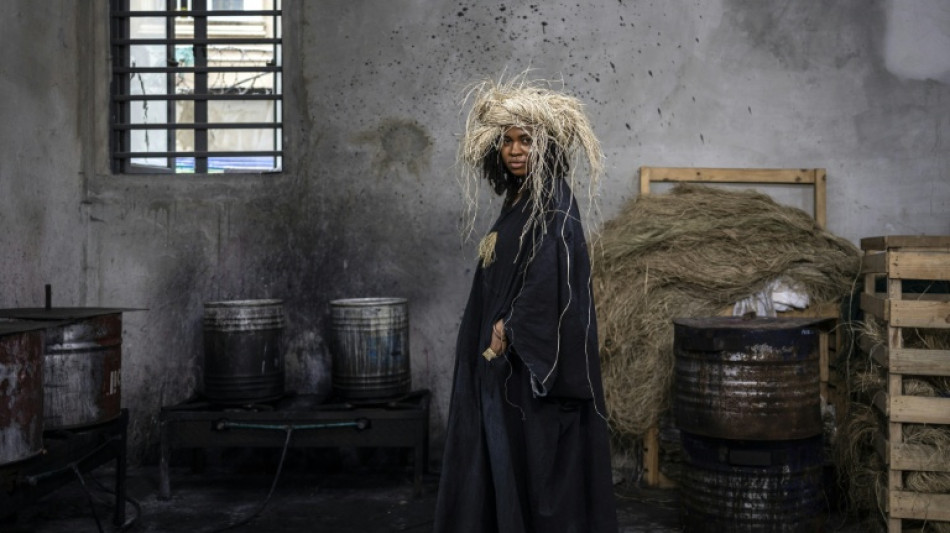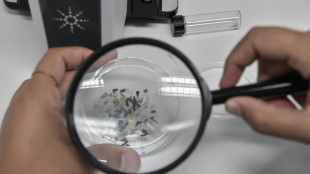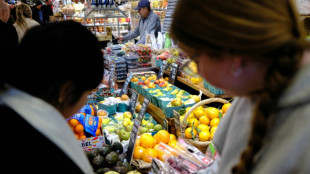
-
 Rybakina stuns Swiatek to reach Australian Open semi-finals
Rybakina stuns Swiatek to reach Australian Open semi-finals
-
US ouster of Maduro nightmare scenario for Kim: N. Korean ex-diplomat

-
 Svitolina credits mental health break for reaching Melbourne semis
Svitolina credits mental health break for reaching Melbourne semis
-
Japan's Olympic ice icons inspire new skating generation

-
 Safe nowhere: massacre at Mexico football field sows despair
Safe nowhere: massacre at Mexico football field sows despair
-
North Korea to soon unveil 'next-stage' nuclear plans, Kim says

-
 French ex-senator found guilty of drugging lawmaker
French ex-senator found guilty of drugging lawmaker
-
US Fed set to pause rate cuts as it defies Trump pressure

-
 Sleeping with one eye open: Venezuelans reel from US strikes
Sleeping with one eye open: Venezuelans reel from US strikes
-
Venezuela's acting president says US unfreezing sanctioned funds

-
 KPop Demon Hunters star to open Women's Asian Cup
KPop Demon Hunters star to open Women's Asian Cup
-
Trump warns of 'bad things' if Republicans lose midterms

-
 Russian strikes in Ukraine kill 12, target passenger train
Russian strikes in Ukraine kill 12, target passenger train
-
With Maduro gone, Venezuelan opposition figure gets back to work

-
 Celebrities call for action against US immigration raids
Celebrities call for action against US immigration raids
-
Rubio to warn Venezuela leader of Maduro's fate if defiant

-
 Denver QB Nix 'predisposed' to ankle injury says coach
Denver QB Nix 'predisposed' to ankle injury says coach
-
Lula, Macron push for stronger UN to face Trump 'Board of Peace'

-
 Prass stunner helps Hoffenheim go third, Leipzig held at Pauli
Prass stunner helps Hoffenheim go third, Leipzig held at Pauli
-
Swiss Meillard wins final giant slalom before Olympics

-
 CERN chief upbeat on funding for new particle collider
CERN chief upbeat on funding for new particle collider
-
Trump warns US to end support for Iraq if Maliki returns

-
 Judge reopens sexual assault case against goth rocker Marilyn Manson
Judge reopens sexual assault case against goth rocker Marilyn Manson
-
South Korea's ex-first lady to learn verdict in corruption case

-
 Rosenior dismisses Chelsea exit for 'untouchable' Palmer
Rosenior dismisses Chelsea exit for 'untouchable' Palmer
-
Markram powers South Africa to win over West Indies

-
 Vladimir Padrino: Venezuela's military power broker
Vladimir Padrino: Venezuela's military power broker
-
Amazon closing Fresh and Go stores in Whole Foods push

-
 Koepka nervous about game and fans in PGA Tour return
Koepka nervous about game and fans in PGA Tour return
-
Trump's Iowa trip on economy overshadowed by immigration row

-
 Dortmund coach says Inter Milan are improved under Chivu
Dortmund coach says Inter Milan are improved under Chivu
-
US border chief in Minneapolis as Trump tries to calm crisis

-
 What to know about America's colossal winter storm
What to know about America's colossal winter storm
-
Iran warns against 'instability' after US strike group arrives

-
 GM reports quarterly loss but boosts shareholder returns
GM reports quarterly loss but boosts shareholder returns
-
US banks fight crypto's push into Main Street

-
 NFL Bills make offensive coordinator Brady new head coach
NFL Bills make offensive coordinator Brady new head coach
-
TikTok settles hours before landmark social media addiction trial

-
 Newcastle braced for 'ultimate test' against PSG after storm disruption
Newcastle braced for 'ultimate test' against PSG after storm disruption
-
Brook blitz ends Sri Lanka's unbeaten home run, England clinch series

-
 LVMH 2025 net profit drops 13% to 10.9 bn euros
LVMH 2025 net profit drops 13% to 10.9 bn euros
-
Philip Glass pulls Kennedy Center premiere after Trump takeover

-
 Slot says Liverpool must fix 'very bad cocktail'
Slot says Liverpool must fix 'very bad cocktail'
-
How to assess microplastics in our bodies? Scientists have a plan

-
 US sued over deadly missile strikes on alleged drug boats
US sued over deadly missile strikes on alleged drug boats
-
Trump ally Asfura sworn in as Honduras president

-
 US border enforcer set to leave Minneapolis as Trump tries to calm crisis
US border enforcer set to leave Minneapolis as Trump tries to calm crisis
-
US consumer confidence drops to lowest level since 2014

-
 Teens underwhelmed by France's social media ban
Teens underwhelmed by France's social media ban
-
Trump ally Nasry Asfura sworn in as Honduras president


Local fabrics, fibres shine at eco-centred Lagos Fashion Week
Four days ahead of her show at Lagos Fashion Week, the sewing machines at Abasiekeme Ukanireh's workshop were still buzzing.
Ukanireh, the founder of the popular Nigerian brand Eki Kere, met with models and tailors for the final preparations ahead of one of Africa's biggest fashion events, which ran through Sunday.
On the agenda: local materials, upcycling and African craftsmanship.
"Every single year for a brand, for me, as a designer, I always try to take it a step further in terms of being sustainable," Ukanireh, 35, told AFP.
Sustainability -- long both a bugbear and a buzzword in the fashion industry -- was a key feature of this year's Lagos Fashion Week, with designers from across the continent tapping into everything from traditional fabrics to banana fibre and coffee grounds.
Launched in 2020, Ukanireh's brand is known for its use of raffia, a grassy fibre from palm trees used in everything from thatched roofs to trendy bags.
This year, she played up the use of indigo and dyes made from kola nuts -- though she hadn't forgotten her raffia roots.
During her show Sunday, dozens of models walked the runway wearing outfits inspired by traditional wedding ceremonies in Ikot Ekpene, a historic town popularly known as "Raffia City" in southern Akwa Ibom state, where Ukanireh hails from.
The traditional wedding lace was swapped for cardboard, linen and raffia -- which is 100 percent biodegradable and compostable.
- Training the next generation -
In 2018, the Lagos Fashion Week founder Omoyeni Akerele and her team launched Green Access, an incubator programme that identifies, trains and supports young African designers.
"Even though sustainability is at the core of their design practice, it is to encourage them to even be more sustainable by rethinking their choices at every stage of the creative process, and understanding that it begins with materials," Akerele said.
Lagos Fashion Week also hosts what it calls "Swapshop" events, which allow people to exchange clothes they no longer wear for new ones.
"We all have clothes at home that we no longer wear," said 43-year-old businesswoman Danielle Chukwuma, who has attended several editions of the show.
"It's great to be able to swap them with people as stylish as those attending this kind of event."
- Designers versus consumerism -
Apart from Nigerian brands, Chukwuma has also discovered other African talents, including the Indian-Kenyan designer Ria Ana Sejpa of the brand LilaBare.
This year was Sejpa's third appearance at Lagos Fashion Week.
"Lagos is the fashion capital of Africa," she told AFP. "Fashion is a part of the culture here. People take pride in the way they dress, they love to stand out, and they aren't afraid to be fearless or glamorous."
The 34-year-old designer is known for making clothes from pineapple fibre, banana fibre and coffee grounds.
"It is essential to take into consideration your ecosystem, the strengths of the environment and the people around you, and to make conscious decisions at every step of the fashion creation process," Sejpa said.
31-year-old Florentina Hertunba, who is making waves with her brand Hertunba, shared the same view.
She said she incorporates traditional Nigerian fabrics such as aso oke and akwete as well as other locally available materials into her designs and uses biodegradable packaging to cut down waste.
"This piece is recycled," the young designer explained, pointing to a patterned black dress in her Lagos studio. "An old fabric was transformed into sewing thread and then reused to create it."
But for her, sustainability is only sustainable if consumers join the movement.
"One of the greatest dangers is this culture of overconsumption, where we constantly buy new clothes for every occasion," she told AFP. "Sustainable fashion is making progress, but overconsumption is too."
E.Gasser--VB




